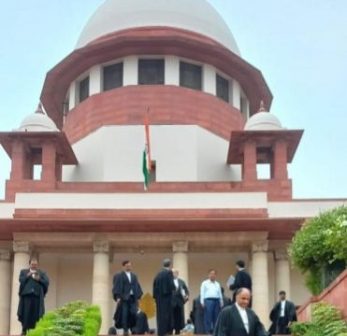By Sumit Saxena
New Delhi, Feb 19 (IANS) The Supreme Court has ruled that conviction of a husband and his relatives for cruelty to the wife under Section 498A of the IPC (husband or relative of the husband of a woman subjecting her to cruelty) would not be sustainable when the marriage between the parties had been declared null and void.
A bench comprising justices B.R. Gavai and Vikram Nath said: “Undisputedly, the marriage between the appellant No.1 and PW-1 (wife) has been found to be null and void. As such, the conviction under Section 498-A IPC would not be sustainable in view of the judgment of this court in the case Shivcharan Lal Verma’s case supra.”
It further added: “So far as the conviction under Sections 3 and 4 of the Dowry Prohibition Act is concerned, the trial judge, by an elaborate reasoning, arrived at after appreciation of evidence, has found that the prosecution has failed to prove the case beyond reasonable doubt.”
The couple got married on December 4, 2003 and soon after, marital disputes arose between the parties and they started residing separately.
The wife filed a complaint before the Deputy Superintendent of Police, Kanyakumari.
After investigation, the chargesheet was filed for the offences punishable under Section 498-A IPC and Sections 3 and 4 of the Dowry Prohibition Act, 1961 against the four accused — husband, mother-in-law, father-in-law and brother-in-law.
At the conclusion of the trial, the trial judge acquitted all the accused persons of all the offences charged with. The state government filed an appeal in the high court and the wife also filed a revision petition.
“The appeal was partly allowed. By the impugned judgment and order, the acquittal of accused Nos. 1 to 3 was set aside and they were convicted for the offences punishable under Section 498-A IPC and Sections 3 and 4 of the Dowry Prohibition Act,” said the apex court, in its order. The husband and the family members moved the apex court against the Madras High Court order.
Senior advocate S. Nagamuthu, representing the appellants, submitted that the marriage between the parties has been held to be null and void by the judgment of the High Court of Madras, Madurai Bench, by an order passed on February 25, 2021.
He further argued that in view of the judgment of the apex in the case of Shivcharan Lal Verma v. State of Madhya Pradesh reported in (2007), the conviction under Section 498-A IPC would not be sustainable.
Joseph Aristotle, counsel for Tamil Nadu, and Vinodh Kanna, counsel for the wife, vehemently opposed the appeals.
The counsel submitted that, even if it is held that the conviction under Section 498-A IPC is not sustainable, the conviction under Sections 3 and 4 of the Dowry Prohibition Act would still remain.
The apex court said: “In an appeal/revision, the high court could have set aside the order of acquittal only if the findings as recorded by the trial court were perverse or impossible. We have perused the judgment of the trial judge. We do not notice any perversity in the approach adopted by the trial judge. The view taken by the trial court also cannot be said to be impossible.”
It further added that “in that view of the matter, the High Court ought not to have interfered with the well-reasoned judgment of the trial Judge. The appeals are, therefore, allowed. The judgment and order dated December 7, 2011 passed by the High Court is quashed and set aside and the judgment of the trial court is affirmed. The appellants are acquitted of the charges”.
–IANS
ss/pgh





